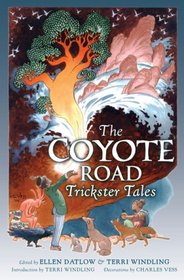This was a mediocre collection. Looking over the table of contents I remember liking quite a few of the stories, and really disliking only a couple, but very little stands out.
"The Listeners" was very engaging, but ended just when things were getting started: it felt like the opening chapter of a fascinating novel.
"The Chamber Music of Animals" by Katherine Vaz and "The Dreaming Wind" by Jeffery Ford were dense with metaphor and style, and almost elevated themselves to poetry, but not quite.
"The Fiddler of Bayou Teche" by Delia Sherman; "Friday Night at St. Cecilia's" by Ellen Klages; "The Fortune-Teller" by Patricia McKillip; "Crow Roads" by Charles de Lint; "Honored Guest" by Ellen Kushner; "Black Rock Blues" by Will Shetterly; "The Constable of Abal" by Kelly Link; and "The Other Labyrinth" by Jedediah Berry all had a classic trickster tale feel and were strong enough that I will be seeking out more by the authors I didn't already know and love.
"The Evolution of Trickster Stories Among the Dogs of North Park After the Change" by Kij Johnson closed the collection and was the only story that I will carry with me for some time; it was beautiful and tragic and said something about the human condition which none of the other tales accomplished.
I liked the idea that there was poetry collected here as well, but sadly all but one fell flat: "How Raven Made His Bride" by Theodora Goss was a pretty little thing that felt just right.
The introduction (and preface) were informative, though the introduction waxed a little long, but I can't decide if I liked the fact that the author information and the statement by the author for the reason behind the story came after the story itself; with authors I already knew I liked that sequence just fine, but I think it would have been nice to at least have the editor's introduction beforehand for the stories by authors I had never heard of before.
While I loved the theme of this collection, I think most of the authors struggled to find the right feel for a trickster story. Trickster tales are teaching tales in most cultures, and while there were trickster characters in all the stories, only Kij Johnson's felt like it was attempting to explain the world as it is or should be. As a result I can only give this collection three stars.
"The Listeners" was very engaging, but ended just when things were getting started: it felt like the opening chapter of a fascinating novel.
"The Chamber Music of Animals" by Katherine Vaz and "The Dreaming Wind" by Jeffery Ford were dense with metaphor and style, and almost elevated themselves to poetry, but not quite.
"The Fiddler of Bayou Teche" by Delia Sherman; "Friday Night at St. Cecilia's" by Ellen Klages; "The Fortune-Teller" by Patricia McKillip; "Crow Roads" by Charles de Lint; "Honored Guest" by Ellen Kushner; "Black Rock Blues" by Will Shetterly; "The Constable of Abal" by Kelly Link; and "The Other Labyrinth" by Jedediah Berry all had a classic trickster tale feel and were strong enough that I will be seeking out more by the authors I didn't already know and love.
"The Evolution of Trickster Stories Among the Dogs of North Park After the Change" by Kij Johnson closed the collection and was the only story that I will carry with me for some time; it was beautiful and tragic and said something about the human condition which none of the other tales accomplished.
I liked the idea that there was poetry collected here as well, but sadly all but one fell flat: "How Raven Made His Bride" by Theodora Goss was a pretty little thing that felt just right.
The introduction (and preface) were informative, though the introduction waxed a little long, but I can't decide if I liked the fact that the author information and the statement by the author for the reason behind the story came after the story itself; with authors I already knew I liked that sequence just fine, but I think it would have been nice to at least have the editor's introduction beforehand for the stories by authors I had never heard of before.
While I loved the theme of this collection, I think most of the authors struggled to find the right feel for a trickster story. Trickster tales are teaching tales in most cultures, and while there were trickster characters in all the stories, only Kij Johnson's felt like it was attempting to explain the world as it is or should be. As a result I can only give this collection three stars.




